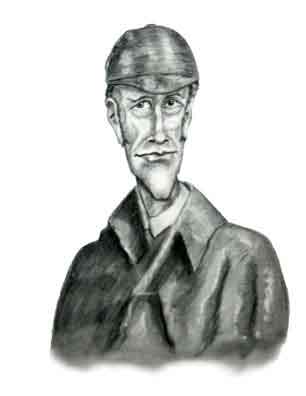Ronald Howard - The Best Sherlock Holmes?

Ronald Howard was born in an acting family. His father, Leslie, was a major star in his lifetime and remains an iconic figure to classic film buffs. Leslie played the lead (or one of the leads) in the 1936 adaptation of Romeo and Juliet, and he hit the major matinee market as the Scarlet Pimpernel in the 1934 film of the same name. Last but not least Leslie was cast as Scarlett O'Hara's hearthrob, Ashley Wilkes, in Gone with the Wind. So why is Ronald, with well over a hundred shows and motion pictures to his credit, so little known?
Known as "Wink" to family and friends, Ronald began serious acting just as Hollywood went into its post-war slump partly (at least) due to the rapid rise of television. In addition to stage work and some motion pictures, Wink managed to land steady employment, but often in one-time or supporting roles in the 1950's and 60's "anthology" shows. Although such series, like "Alfred Hitchcock Presents", "Triller", and the "Kraft Mystery Theater", gave many actors steady work, they were not the best vehicle for stardom. For that you needed a series, preferably where you were the star. The series that featured Wink were not, to put in mildy, very successful, and with one exception he was always relegated to secondary parts.
That exception was Wink's only true starring role. From 1954 to 1955 he played Sherlock Holmes in the (American) television series named (what else?) Sherlock Holmes. The episodes were all thirty minute original scripts, and only one ("The Red Headed League") had its title taken directly from the original Sherlockian canon by Sir Arthur Conan Doyle. The Sherlock fan, though, can easily recognize various borrowings here and there, and the "Adventure of the Engineer's Shoe" is a close but less grisly rendering of "The Adventure of the Engineer's Thumb".
The modern viewer - allowing of course for this being 1950's television - will be surprised at how good this early Sherlock was. Wink 's performance is easily on par with any of the actors playing Holmes before or since - we include for comparison Basil Rathbone and Jeremy Brett (as good as those gentlemen were) - or today, Robert Downey, Jr. Wink's character, though, was more of a light hearted Holmes. Nominally the series was a drama, but because the humorous by-play between the characters was so integrated into the scripts, the episodes are a welcome respite from today's series where to save money the shows are collages of fast cuts back and forth between talking heads on poorly lit sets. Believe it or not, in Sherlock Holmes you actually get some medium range and long shots. Also with only half an hour allotted to the story, the scripts are fast and compact, and the action really moves along. But as we said, this was 1950's television, and in a total of thirty-nine episodes some necessarily went a bit over the top. Certainly those like "The Case of the Texas Cowgirl" are - probably intentionally - perhaps just a bit too camp.
Of course with Sherlock Holmes, you have to have Dr. John H. Watson, M. D., here played by Howard Marion Crawford. Marion plays Watson much closer to the character of the original stories - sharp, energetic, and not the bumbling ass (to use the words of Sir Arthur's son, Adrian) of too many of the early films. Watson is the man of action, even more so than in the books or stories, and often personally and literally trips up the criminals who have been ferreted out by Sherlock's brainwork. We also see Dr. Watson - again as is alluded to in the stories - to be quite the ladies man. As they board a train Sherlock remarked that Watson would not have been late if he hadn't tarried so long with a barmaid. When asked (as always) to explain his deductions, Holmes replied he saw Watson's elbow was wet from leaning on a bar. Knowing Watson, Holmes added, he wasn't talking to a bar man. Then in another episode an assailant punched Watson in the eye, and everyone assumed the good doctor had been a bit too familiar with one of the local lasses.
"What happened to you, Doctor?" Inspector Lestrade (played by Archie Duncan) asked.
"I walked into a door," Watson snapped.
"Oh," Lestrade smirked, "Was she a pretty door?"
Why someone as good an actor as Wink never achieved stardom is still a good question. Probably it was just bad luck, and he just never got the big break that fell to some of the other bit and character actors of his day like Leonard Nimoy, William Shatner, and James Doohan (whoever they were). Finally, in his mid-fifties Wink gave up acting altogether and set up as an art dealer in the UK in West Dorset, not far from the major resort town of Bournemouth.
References
Sherlockhoward, http://sherlockhoward.homestead.com/ Ronald seems to be acquiring a devoted, if for now small, following, largely due to the release of the 39 episodes of his Sherlock Holmes series. This site is the most comprehensive for information about the life of Wink Howard.
Ronald Howard, Internet Movie Data Base http://www.imdb.com/name/nm0397580/ Is this a first? A CooperToons to cite references only from the Internet? Pshaw, as Holmes might have said. CooperToons is by no means and electronic or cybernet reactionary, and some day it may be that all good information - and little or none of the bad - can be found on-line.